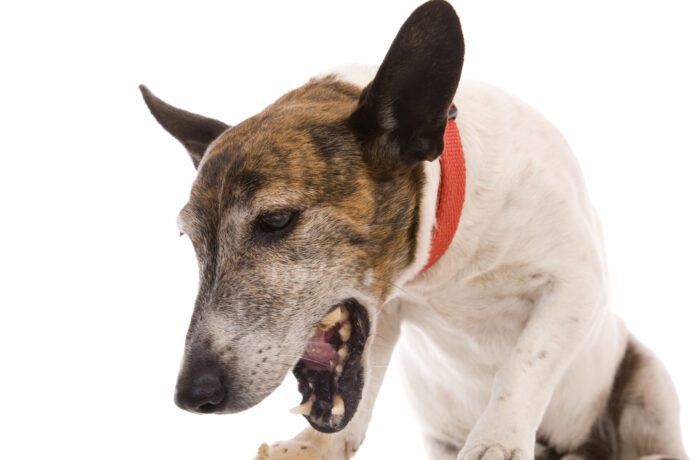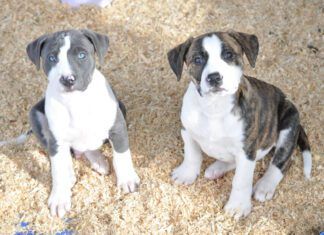
A dry, hacking cough that sounds like your dog is gagging – almost as if something is stuck in his throat – followed by the appearance of foamy white mucus (known as phlegm) from his mouth are signs of tracheal irritation. The trachea (or windpipe) is the tube that connects your dog’s throat to his lungs and through which air passes. Irritation of the trachea can be a normal physiologic response or it can be a sign of illness. Understanding how the trachea works can help you recognize which cough and appearance of phlegm calls for a veterinary visit.
How Tracheal Irritation Causes a Dog to Cough and Gag
The inside of your dog’s trachea is lined with microscopic hairs called cilia. These cilia are covered by a thin layer of mucus. Cilia rhythmically beat in an upward direction, moving the mucus layer away from the lungs and toward the throat. This is called the mucociliary escalator.
When your dog inhales bacteria, viruses, dust, or anything else the body does not want to reach the lungs, these particles get stuck in the mucus layer. The cilia beat and move the mucus containing these particles toward the throat where they can be coughed up or swallowed. Inhaled irritants, like dirt, dust, or even air pollutants, are naturally trapped in the mucociliary escalator and moved up to the throat where they can be coughed up or swallowed.
Think of this clever apparatus like the up escalator at the mall. As the person riding the escalator, you are like a particle that gets stuck in the mucus. When you get on the up escalator, you have no choice but to go up to the next floor. Even if you try to run down the escalator to go back to the previous floor, the escalator is still moving you upward. And you cannot get off the escalator until you are on the next floor!
Inhaled irritants, like dirt, dust, or even air pollutants, are naturally trapped in the mucociliary escalator and moved up to the throat where they can be coughed up or swallowed. If your dog coughs up phlegm once or twice and then does not cough any more, your dog’s mucociliary escalator is doing its job. But if your dog coughs up phlegm every few minutes, there is a problem that needs to be diagnosed and addressed by your vet.
Are Gagging and Coughing up Phlegm Kennel Cough Symptoms
The most common cause of coughing up phlegm is infectious tracheobronchitis, also known as kennel cough. The bacterium Bordetella bronchiseptica is a common pathogen that causes kennel cough. Bordetella has two properties that help it to wreak havoc on your dog’s trachea. This bacterium is able to bind to the cilia in the mucociliary escalator and immobilize them, ceasing the upward movement of mucus. The mucus accumulates in the trachea and has to be coughed up. This is what causes the dry, hacking cough followed by coughing up phlegm.
Also, as the mucus accumulates, Bordetella bacteria disable the immune cells that line the trachea so they can no longer engulf and destroy pathogens. This is like sending out invitations to other bacteria or viruses to join the party and create a bigger infection. Most young and otherwise healthy dogs are able to clear the infection before it gets worse. But sometimes a simple case of kennel cough can turn into pneumonia.
Other Reasons Your Dog is Coughing up White Foam
External pressure on the trachea can cause a dog to cough up phlegm. Usually, this is caused by a dog pulling on leash. If your dog pulls on leash to the point of coughing, get some help from a trainer – or, at the very least, have your dog fitted for a front-clip harness or head halter. These management devices move the pressure from the dog’s pulling away from his throat and prevent him from pulling as strongly.
The cough associated with tracheal irritation sounds like your dog has something stuck in his throat. In most cases, he’s just coughing up mucus. The exception is when your dog has swallowed something that has gotten stuck in his esophagus. Esophageal foreign bodies can place external pressure on the trachea and trigger a phlegmy cough.
If your dog is coughing up yellow or pink-tinged discharge or blood, or is having difficulty breathing, your dog may be experiencing a life-threatening emergency. Take your dog to his primary care vet or to the nearest veterinary emergency hospital immediately.






Coughing up white foam can also happen with mega-esophagus as mentioned in a previous article. Dog is trying to clear throat to prevent aspiration after regurgitating food.
One of my small dogs, a Morkie, would frequently cough up phlegm. It was not tinged with any color and did not contain blood. And the cough was definitely not a kennel cough. The vet worked with me, asking me to keep a diary of when this coughing occurred, but could not detect any underlying illness. Based on this article, I’m thinking that poor Tapsi’s cough was just nature’s way of clearing her trachia. How I fussed over that dog, convinced that she had some terrible and mysterious disease.